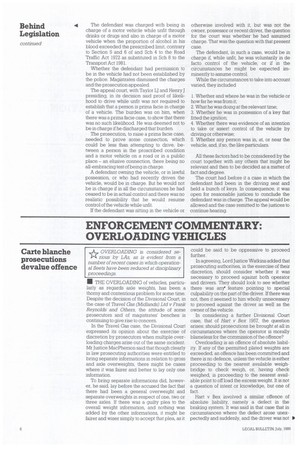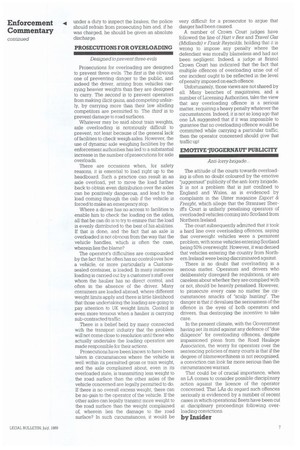ENFORCEMENT COMMENTARY: OVERLOADING VEHICLES
Page 114

Page 115

If you've noticed an error in this article please click here to report it so we can fix it.
1"1, OVERLOADING is considered se rious by LAs, as is evident from a number of recent cases in which operational fleets have been reduced at disciplinary proceedings, • THE OVERLOADING of vehicles, particularly as regards axle weights, has been a thorny and contentious problem for some time. Despite the decision of the Divisional Court, in the case of Travel Gas (Midlands) Ltd v Frank Reynolds and Others, the attitude of some prosecutors and of magistrates' benches is continuing to give rise to concern.
In the Travel Gas case, the Divisional Court expressed its opinion about the exercise of discretion by prosecutors when multiple overloading charges arise out of the same incident. Mr Justice MacPherson said that though clearly in law prosecuting authorities were entitled to bring separate informations in relation to gross and axle overweights, there might be cases where it was fairer and better to lay only one information.
To bring separate informations did, however, he said, lay before the accused the fact that there had been a general overweight and separate overweights in respect of one, two or three axles. If there was a guilty plea to the overall weight information, and nothing was added by the other informations, it might be fairer and wiser simply to accept that plea, as it could be said to be oppressive to proceed further.
In agreeing, Lord Justice Watkins added that prosecuting authorities, in the exercise of their discretion, should consider whether it was necessary to proceed against both operator and drivers. They should look to see whether there was any feature pointing to special culpability on the part of the driver. If there was not, then it seemed to him wholly unnecessary to proceed against the driver as well as the owner of the vehicle.
In considering a further Divisional Court case, that of Hart v Bex 1957, the question arises: should prosecutions be brought at all in circumstances where the operator is morally blameless for the commission of the offence?
Overloading is an offence of absolute liability. If any of the permitted plated weights are exceeded, an offence has been committed and there is no defence, unless the vehicle is either proceeding to the nearest available weighbridge to check weigh, or, having check weighed, is proceeding to the nearest available point to off load the excess weight. It is not a question of intent or knowledge, but one of fact.
Hart v Bex involved a similar offence of absolute liability, namely a defect in the braking system. It was said in that case that in circumstances where the defect arose unexpectedly and suddenly, and the driver was not 111 • under a duty to inspect the brakes, the police should refrain from prosecuting him and, if he was charged, he should be given an absolute discharge.
Prosecutions for overloading are designed to prevent three evils. The first is the obvious one of preventing danger to the public, and indeed the driver, arising from vehicles carrying heavier weights than they are designed to carry. The second is to prevent operators from making illicit gains, and competing unfairly, by carrying more than their law abiding competitors are permitted to. The third is to prevent damage to road surfaces.
Whatever may be said about train weights, axle overloading is notoriously difficult to prevent, not least because of the general lack of facilities to check weigh axles. However, the use of dynamic axle weighing facilities by the enforcement authorities has led to a substantial increase in the number of prosecutions for axle overloads, There are occasions when, for safety reasons, it is essential to load right up to the headboard. Such a practice can result in an axle overload, yet to move the load further back to obtain even distribution over the axles can be positively dangerous, and lead to the load coming through the cab if the vehicle is forced to make an emergency stop.
Where a driver has no access to facilities to enable him to check the loading on the axles, all that he can do is to try to ensure that the load is evenly distributed to the best of his abilities. If that is done, and the fact that an axle is overloaded is not obvious from the way that the vehicle handles, which is often the case, wherein lies the blame?
The operator's difficulties are compounded by the fact that he often has no control over how a vehicle, or more particularly a Customssealed container, is loaded. In many instances loading is carried out by a customer's staff over whom the haulier has no direct control, and often in the absence of the driver. Many containers are loaded abroad, where different weight limits apply and there is little likelihood that those undertaking the loading are going to pay attention to UK weight limits. Control is even more tenuous when a haulier is carrying sub-contracted traffic.
There is a belief held by many connected with the transport industry that the problem will not come close to resolution until those who actually undertake the loading operation are made responsible for their actions.
Prosecutions have been known to have been taken in circumstances where the vehicle is well within its permitted gross or train weight, and the axle complained about, even in its overloaded state, is transmitting less weight to the road surface than the other axles of the vehicle concerned are legally permitted to do. If there is no overall excess weight, there can be no gain to the operator of the vehicle. If the other axles can legally transmit more weight to the road surface than the weight complained of, wherein lies the damage to the road surface? ln such circumstances, it would be very difficult for a prosecutor to argue that danger had been caused.
A number of Crown Court judges have followed the line of Hart v Bex and Travel Gas (Midlands) v Frank Reynolds, holding that it is wrong to impose any penalty where the defendant was morally blameless and had not been negligent. Indeed, a judge at Bristol Crown Court has indicated that the fact that multiple offences of overloading arise out of one incident ought to be reflected in the level of penalty imposed on each offence.
Unfortunately, those views are not shared by all. Many benches of magistrates, and a number of Licensing Authorities, take the view that any overloading offence is a serious matter, requiring a heavy penalty whatever the circumstances. Indeed, it is not so long ago that one LA suggested that if it was impossible to gurantee that no overloading offence would be committed while carrying a particular traffic, then the operator concerned should give that traffic up!
The attitude of the courts towards overloading is often no doubt coloured by the emotive "juggernaut" publicity of the anti-lorry brigade. It is not a problem that is just confined to England and Wales, as is evidenced by complaints in the Ulster magazine Export & Freight, which allege that the Stranraer Sherills Court is unfairly penalising operators of overloaded vehicles coming into Scotland from Northern Ireland.
The court subsequently admitted that it took a hard line over overloading offences, saying that overweight vehicles were a persistent problem, with some vehicles entering Scotland being 50% overweight. However, it was denied that vehicles entering the country from Northern Ireland were being discriminated against.
There is no doubt that overloading is a serious matter. Operators and drivers who deliberately disregard the regulations, or are careless about whether they are complied with or not, should be heavily penalised, However, to prosecute every case no matter the circumstances smacks of 'scalp hunting". The danger is that it devalues the seriousness of the offence in the eyes of both operators and drivers, thus destroying the incentive to take care.
In the present climate, with the Government having set its mind against any defence of "due diligence" for overloading offences, despite impassioned pleas from the Road Haulage Association, the worry for operators over the sentencing policies of many courts is that if the degree of blameworthiness is not recognised, a conviction can look far more serious than the circumstances warrant.
That could be of crucial importance, when an LA comes to consider possible disciplinary action against the licence of the operator concerned. That LAs do regard such offences seriously is evidenced by a number of recent cases in which operational fleets have been cut at disciplinary proceedings following overloading convictions.
by Insider




















































































































